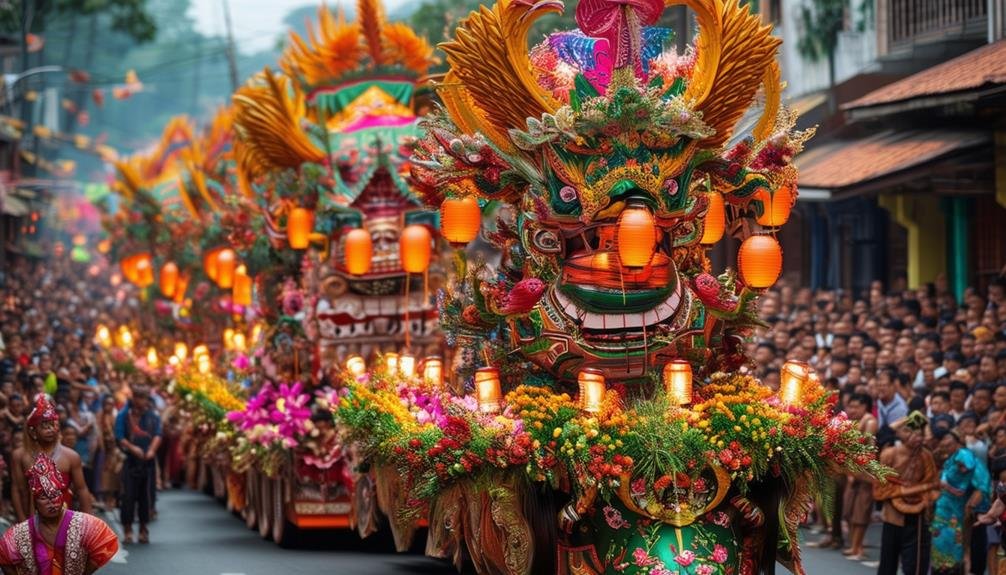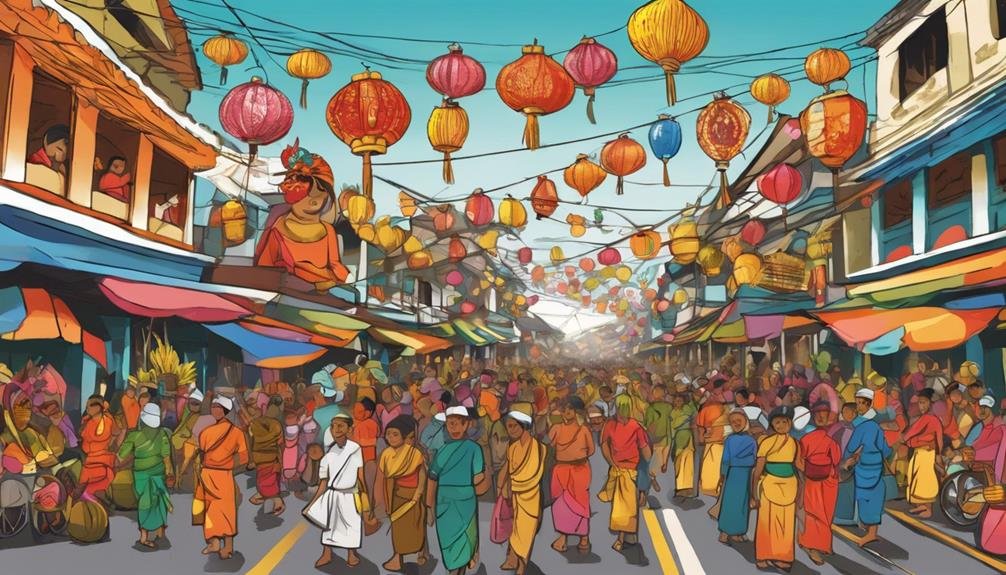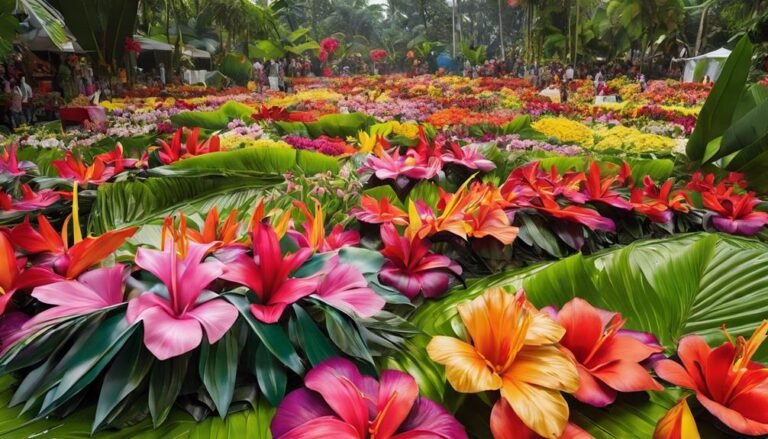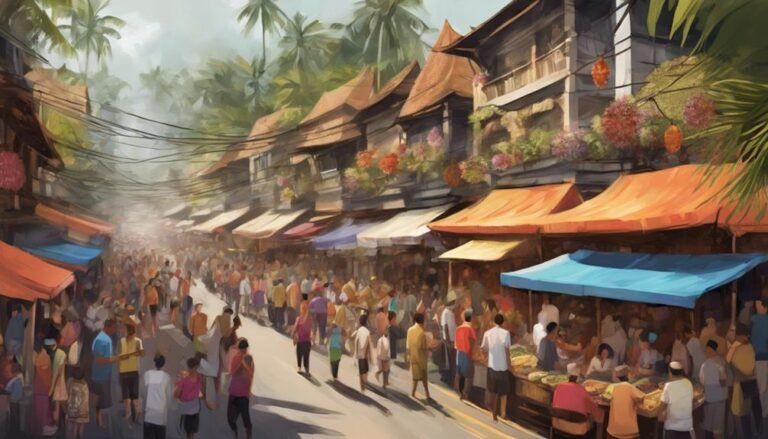Tabot Festival Indonesia

the vibrant Tabot Festival celebrated in Bengkulu. This 10-day festival honours the arrival of Muslim settlers and Islamic scholar Syekh Abdul Rauf, blending Malay and Islamic influences. You’ll be captivated by colourful processions, traditional dances, and local delicacies like Gulai Tabot.
With its roots in the 16th century, the festival showcases the region’s cultural identity and Islamic heritage. As you immerse yourself in this cultural extravaganza, you’ll uncover a complex history, vibrant traditions, and a community that embodies a unique cultural fusion and that’s just the beginning.
Key Takeaways
• Tabot Festival in Indonesia celebrates the rich cultural heritage of Bengkulu, commemorating the arrival of Muslim settlers and honouring Islamic scholar Syekh Abdul Rauf.
• The festival takes place annually in September or October, typically lasting 10 days with music, dance, and cultural performances showcasing the region’s cultural identity.
• The festival’s name “Tabot” is derived from the Arabic word “tabut,” meaning “coffin” or “bier,” reflecting the historical roots and cultural fusion of the region.
• The celebration features a vibrant procession with ornate floats, local delicacies like Gulai Tabot, and a cultural fusion of Islamic traditions with local customs.
• Tabot Festival is a significant cultural event in Indonesia, promoting cultural exchange, community engagement, and showcasing the country’s rich Islamic heritage.
What is Tabot Festival and Why and When Tabot Festival is celebrated

Celebrating the rich cultural heritage of Bengkulu, Indonesia, you’ll find the vibrant Tabot Festival, a unique and intriguing event that commemorates the arrival of Muslim settlers in the region. This festival is a beautiful representation of cultural fusion, blending Islamic traditions with local customs.
The Tabot Festival is celebrated annually to mark the arrival of Muslim settlers in Bengkulu, specifically to honour the arrival of Syekh Abdul Rauf, a renowned Islamic scholar who introduced Islam to the region. The festival takes place over several days, usually in September or October, and is a time for the community to come together, share stories, and showcase their rich cultural heritage.
During the festival, you’ll witness colourful processions, traditional music, and vibrant dance performances. The air is filled with the aroma of delicious local cuisine, and the streets are adorned with vibrant decorations.
Facts AboutTabot Festival
One of the most striking aspects of the festival is its unique fusion of culture and fashion. The Tabot Festival is a demonstration of the rich cultural identity of the Bengkulu people, where traditional attire is an integral part of the celebrations.
| Festival Feature | Interesting Fact |
|---|---|
| Festival Fashion | Incorporates traditional Bengkulu clothing, blending Malay and Islamic influences |
| Cultural Significance | Celebrates the cultural identity of the Bengkulu people, promoting unity and community |
| Festival Duration | Typically lasts for 10 days filled with music, dance, and cultural performances |
| Traditional Food | Features local delicacies such as Gulai Tabot, a spicy curry dish |
| Unique Tradition | Includes the iconic Tabot procession, where ornate floats are paraded through the streets |
Why Tabot Festival Is Celebrated

You’re likely wondering what drives the Bengkulu people to come together and celebrate the Tabot Festival with such fervor, and the answer lies in the festival’s historical and cultural significance. The Tabot Festival is proof to the region’s rich Islamic heritage, which has been shaped by centuries of cultural exchange between Arab traders, Indian merchants, and local Malay communities. This unique blend of cultures has resulted in a distinct Islamic tradition that’s both authentic and eclectic.
As you explore the festival, you’ll notice the vibrant colours, the rhythmic beats, and the infectious energy of the participants. It’s more than just a celebration; it’s a declaration of the Bengkulu people’s pride in their heritage.
Through the Tabot Festival, the Bengkulu people aren’t only preserving their cultural heritage but also sharing it with the world. The festival serves as a platform for cultural exchange, allowing visitors to experience the beauty and diversity of Indonesian culture.
Etymology of Tabot FestivalIndonesia
Exploring the origins of the Tabot Festival‘s name reveals a fascinating story, with ‘Tabot’ being derived from the Arabic word ‘tabut,’ meaning ‘coffin’ or ‘bier,’ which is intricately linked to the festival’s historical roots. As you investigate the etymology of Tabot, you’ll uncover a rich cultural fusion that has shaped the festival’s identity.
The Arabic influence is a confirmation of the significant Islamic presence in Indonesia, which has blended with indigenous customs to create a unique cultural mosaic. The Tabot Festival, fundamentally, embodies this cultural fusion, reflecting the nation’s complex history and its people’s ability to adapt and evolve.
The ‘tabut’ reference also alludes to the festival’s connection to the prophet Moses, who’s revered in Islamic tradition. This connection has contributed to the festival’s significance, making it an integral part of Indonesian cultural heritage.
History of Tabot FestivalIndonesia

As you explore the History of Tabot Festival Indonesia, you’ll find that the festival’s origins are steeped in a rich cultural heritage.
You’ll discover that ancient Islamic influences have shaped the festival’s development over time, blending with local customs to create a unique celebration.
Origins of the Festival
Tabot Festival originated as a unique blend of cultural traditions. You’ll discover that this vibrant celebration is deeply rooted in the country’s rich cultural heritage. As you explore the festival’s origins, you’ll find that it’s a beautiful amalgamation of folklore legacy and cultural revival.
The festival’s history dates back to the 16th century, when Islamic missionaries arrived in Indonesia, bringing with them their traditions and customs. Over time, these Islamic influences merged with the existing Hindu and Buddhist practices, giving birth to a distinct cultural identity.
As you investigate the festival’s origins, you’ll notice that it’s not just a celebration, but a cultural revival of sorts. The festival’s folkloric roots are evident in its vibrant costumes, traditional music, and lively dance performances, all of which pay homage to Indonesia’s rich cultural legacy.
Ancient Islamic Influence
With the arrival of Islamic missionaries in the 16th century, the seeds of a profound cultural transformation were sown, and Indonesia’s cultural landscape was forever altered, laying the groundwork for the unique blend of traditions seen in the Tabot Festival today.
As you explore the history of this vibrant celebration, you’ll notice the subtle yet pervasive influence of Islamic traditions. The architectural landscape of Indonesia, for instance, began to take on a distinctly Islamic flavour, with grand mosques and ornate minarets dotting the skyline. Muslim traders, who’d been traversing the Indian Ocean for centuries, brought with them not only goods but also ideas, customs, and beliefs that would eventually shape the cultural identity of the region.
The fusion of Islamic and local traditions gave birth to a distinct cultural heritage, one that’s still celebrated during the Tabot Festival.
Local Cultural Significance
Beyond the Islamic influences, you’ll discover a rich mosaic of local cultural significance woven into the fabric of the Tabot Festival, a reflection of the region’s unique heritage. As you explore further, you’ll find that community engagement is at the heart of this celebration. The festival brings together people from all walks of life, fostering a sense of unity and social cohesion.
Traditional practices, such as the ceremonial procession and the revered Tabot, are an integral part of the festival, showcasing the region’s cultural identity.
What Are The Dates Tabot FestivalIndonesia Takes Place
The Tabot Festival, which typically takes place on the 10th month of the Islamic calendar, coincides with the Prophet Muhammad’s birthday. The exact dates vary each year, as the Islamic calendar is a lunar calendar, but it usually falls between September and November.
Here’s a rough estimate of the dates for the next few years:
| Year | Dates |
|---|---|
| 2023 | September 26-28 |
| 2024 | September 15-17 |
| 2025 | October 5-7 |
| 2026 | September 25-27 |
Keep in mind that these dates are approximate and might vary depending on the lunar cycle. It’s essential to check the exact dates before planning your trip.
During the Tabot Festival, you’ll experience a unique blend of cultural attractions and festivities. The festival’s cultural significance lies in its ability to bring people together, celebrating the Prophet Muhammad’s birthday with grand processions, traditional music, and delicious local cuisine.
Main Activities & Events in Tabot FestivalIndonesia

From traditional performances to sacred rituals, each event is a window into the country’s rich heritage. By participating in these activities, you’ll gain a deeper understanding of the festival’s significance and the people who celebrate it.
- Traditional Dance Performances: Watch as dancers adorned in colourful costumes perform intricate moves to the rhythm of traditional music.
- Pilgrimage to the Holy Site: Join the procession of devotees as they make their way to the sacred site, carrying sacred objects and offerings.
- Food and Craft Bazaars: Indulge in local delicacies and browse through stalls selling traditional handicrafts, souvenirs, and local products.
Related Festivals In The Same Region
How do the vibrant festivities of the Tabot Festival in Indonesia compare to other celebrations in the region, such as the Galungan Festival in Bali or the Dieng Cultural Festival in Central Java? You might be surprised to find that these Javanese celebrations share a common thread of rich cultural heritage and traditional practices.
| Festival | Location | Description |
|---|---|---|
| Galungan Festival | Bali | A Balinese Hindu celebration to honor the gods and ancestors, marked by vibrant processions and traditional dances. |
| Dieng Cultural Festival | Central Java | A festival showcasing traditional Javanese music, dance, and theatre, set amidst the stunning Dieng Plateau. |
| Tabot Festival | Bengkulu | A unique celebration of Bengkulu’s cultural diversity, featuring traditional music, dance, and theatre performances. |
Interesting Less Known Facts About Tabot FestivalIndonesia
As you explore further into the festival’s traditions, you’ll discover that it’s not just about the vibrant festival fashion, but also about the cultural diversity that makes it so unique. Here are a few interesting facts that might surprise you:
- The festival’s origins are shrouded in mystery: Despite its long history, the exact origins of the Tabot Festival remain unclear, leaving room for speculation and intrigue.
- It’s a celebration of cultural fusion: The festival is a beautiful blend of Islamic, Malay, and indigenous Indonesian cultures, reflecting the region’s rich cultural diversity.
- It’s not just about the Tabot: While the ornate Tabot is the festival’s centerpiece, the celebration also features traditional music, dance, and theater performances.
Here’s a breakdown of the festival’s cultural significance:
| Aspect | Cultural Significance |
|---|---|
| Festival Fashion | Reflects the cultural diversity of Bengkulu, with a mix of traditional and modern attire |
| Cultural Performances | Showcases the region’s rich cultural heritage, with a blend of Islamic, Malay, and indigenous Indonesian influences |
| Food and Drink | Features traditional Bengkulu cuisine, with a focus on local ingredients and spices |
| Community Involvement | Brings together people from all walks of life, fostering a sense of community and social cohesion |
| Economic Impact | Boosts local businesses and contributes to the region’s economic growth |
Tips for attending the Tabot FestivalIndonesia

As you prepare to attend the Tabot Festival in Indonesia, it’s crucial to plan ahead to guarantee a smooth and enjoyable experience.
You’ll need to figure out how to reach the festival, whether that’s by flying into a nearby airport or taking a bus or taxi from a nearby town.
How To Reach Tabot Festival
Reaching the Tabot Festival in Indonesia requires some planning, but with a little prep, you’ll be dancing in the streets of Bengkulu City in no time.
To guarantee a seamless festival experience, it’s vital to plan. Here are three essential steps to get you started:
- Book your flights: Fly into Fatmawati Soekarno Airport (BKS) in Bengkulu City, which is the closest airport to the festival venue. You can book your flights through various airlines, such as Garuda Indonesia or Lion Air.
- Arrange for accommodation: Bengkulu City has a range of hotels and guesthouses that cater to different budgets. Book your accommodation in advance to avoid last-minute hassles.
- Familiarize yourself with the festival schedule: The Tabot Festival typically takes place in September, but dates may vary. Stay updated on the festival schedule to plan your itinerary accordingly.
Weather In Tabot Festival
You’ll want to pack accordingly for the Tabot Festival, as Bengkulu City’s weather can be quite humid and hot during the festival period in September. The rainy season, which typically starts in October, can impact the festival, so it’s essential to check weather forecasts before and during your trip.
To help you prepare, here’s a breakdown of what you can expect:
| Month | Average Temperature (°C) | Average Rainfall (mm) |
|---|---|---|
| September | 28-30 | 150-200 |
| October | 27-29 | 200-250 |
| November | 26-28 | 250-300 |
| December | 25-27 | 300-350 |
| January | 24-26 | 350-400 |
As you can see, September is usually the hottest month and the rainfall increases as the rainy season approaches. Be sure to pack light, breathable clothing, and don’t forget your umbrella or raincoat to get ready for any unexpected rain showers. Stay up-to-date with the latest weather forecasts to make sure you’re well-prepared for the Tabot Festival.
Famous Landmarks To Visit When visiting Indonesia
Among Indonesia’s numerous iconic landmarks, Borobudur Temple, a majestic 9th-century Buddhist monument in Magelang, Central Java, is a must-visit treasure that showcases the country’s rich cultural heritage. As you explore the temple’s intricate carvings and statues, you’ll be struck by the sense of history and spirituality that permeates the site.
When you’re in Indonesia, you shouldn’t miss the opportunity to visit these iconic landmarks:
- Prambanan Temple, is a stunning collection of 9th-century Hindu temples in Yogyakarta, Central Java, known for its beautiful architecture and serene surroundings.
- Borobudur Temple, a majestic 9th-century Buddhist monument in Magelang, Central Java, showcases the country’s rich cultural heritage.
- Monas National Monument, a towering monument in Jakarta, symbolises Indonesia’s struggle for independence and offers panoramic views of the city.
Famous Foods FromTabot Festival

As you immerse yourself in the vibrant atmosphere of the Tabot Festival, the aromas of traditional Indonesian delicacies waft through the air, enticing you to indulge in a culinary adventure. The festival offers a diverse range of authentic Indonesian cuisine, showcasing the country’s rich culinary heritage. From spicy dishes to sweet treats, every bite is a flavorful experience that will leave you craving for more.
Some of the must-try festival delicacies include:
- Sate: Grilled meat skewers, typically made with chicken, beef, or pork, marinated in a mixture of spices and grilled to perfection.
- Gudeg: A traditional dish from Yogyakarta, made from young jackfruit, coconut milk, and spices, served with steamed rice.
- Martabak: A stuffed pancake with savoury fillings such as eggs, vegetables, and meat, or sweet fillings like chocolate and strawberries.
What Is the Significance of Tabot Festival in Comparison to Bunaken Festival in Indonesia?
The Tabot Festival in Indonesia holds great cultural significance, bringing together people to commemorate the martyrdom of Imam Hussein. On the other hand, the Bunaken Festival of Indonesia celebrates the vibrant marine life and environmental conservation efforts, showcasing the country’s rich biodiversity. Both festivals showcase the diversity and traditions of Indonesia.
Frequently Asked Questions
Can Tourists Participate in the Tabot Festival’s Processions and Events?
When attending cultural festivals, you’ll often wonder if you can participate in processions and events. To avoid cultural faux pas, research festival etiquette beforehand, ensuring respectful cultural immersion, and then, you’re likely to be warmly welcomed to join in.
Are There Any Specific Dress Codes or Attire for Attending the Festival?
When attending cultural festivals, you’ll often want to prioritize cultural sensitivity, especially when it comes to dress codes. Opt for modest dressing, covering your shoulders and knees as a sign of respect, ensuring a thoughtful and enriching experience.
Can I Take Photos or Videos During the Festival’s Events and Processions?
When attending cultural festivals, you’ll want to exercise camera etiquette and cultural sensitivity, ensuring you’re not disrupting events or offending locals; ask permission before capturing intimate moments, and be mindful of restricted areas or sacred rituals.
Are There Any Specific Tabot Festival Customs or Traditions I Should Be Aware Of?
When immersing yourself in local celebrations, you’ll want to respect local protocols and cultural nuances, being mindful of subtle customs and traditions that might not be immediately apparent, lest you unintentionally offend the community.
Are There Any Safety Concerns or Precautions I Should Take During the Festival?
During crowded festivals, you’ll want to stay alert and aware of your surroundings, taking note of crowd control measures in place, such as barriers and security personnel, and knowing the location of emergency services availability, just in case.
Conclusion
You’ve immersed yourself in the vibrant Tabot Festival, surrounded by the rhythmic beats of traditional drums and the sweet aroma of local delicacies.
As you reflect on the experience, you realize that this celebration is more than just a manifestation – it’s a reflection of Indonesia’s rich cultural heritage.






